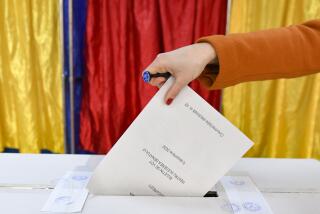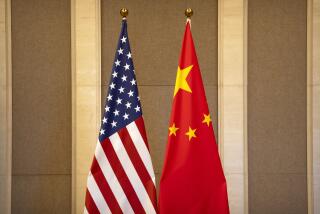Europeans Want Japan to Cut Its Trade Surplus : Commerce: Most have a favorable view of the Pacific power, a survey shows. But they don’t think it is fulfilling its global responsibilities.
- Share via
TOKYO — A majority of people surveyed in major European countries have a favorable view of Japan but believe that it is not fulfilling its international responsibilities, the Foreign Ministry reported Tuesday.
Among the chief criticisms was that Japan needs to correct its trade imbalance. However, many respondents said creation of the single European market planned for 1992 will improve relations between Japan and the European Community, the ministry said in a news release.
The sixth such poll since 1977, it was carried out from September through October by private research organizations in Britain, France, Germany, Belgium, Italy, the Netherlands and Spain.
In all seven countries, “the degree of trust in Japan is rather high,” ranging from 71% to 91%, the ministry said.
In every country except Italy, however, a majority of respondents thought Japan was not fulfilling its international role.
Japan, the world’s No. 2 economic power, has come under criticism for not doing more to assist U.S.-led forces in the Persian Gulf and to ease its chronic trade surpluses.
Many respondents called for a prompt correction of Japan’s surplus with the EC, which totaled $1.49 billion in November. The most commonly cited recommendation was for Japan to open its markets more and expand domestic demand.
Among other findings of the survey:
* Expectations of direct investment from Japan were high in every country.
* Business development by Japanese companies in Eastern Europe was “generally desired.” Most respondents said Japanese companies should invest only in cooperation with Western European countries. In Germany, however, 71% said the Japanese should get involved on their own.
The survey, sponsored by the Foreign Ministry, was conducted by mail in Britain, western Germany and Belgium. Responses came from 1,543 of 6,550 people to whom questionnaires were mailed.
In the other countries, interviews were conducted. A total of 1,936 people participated.
The poll did not give a margin of error. Japanese pollsters do not calculate such margins, contending that they might mislead readers into thinking a poll is more accurate than it really is.
More to Read
Inside the business of entertainment
The Wide Shot brings you news, analysis and insights on everything from streaming wars to production — and what it all means for the future.
You may occasionally receive promotional content from the Los Angeles Times.










